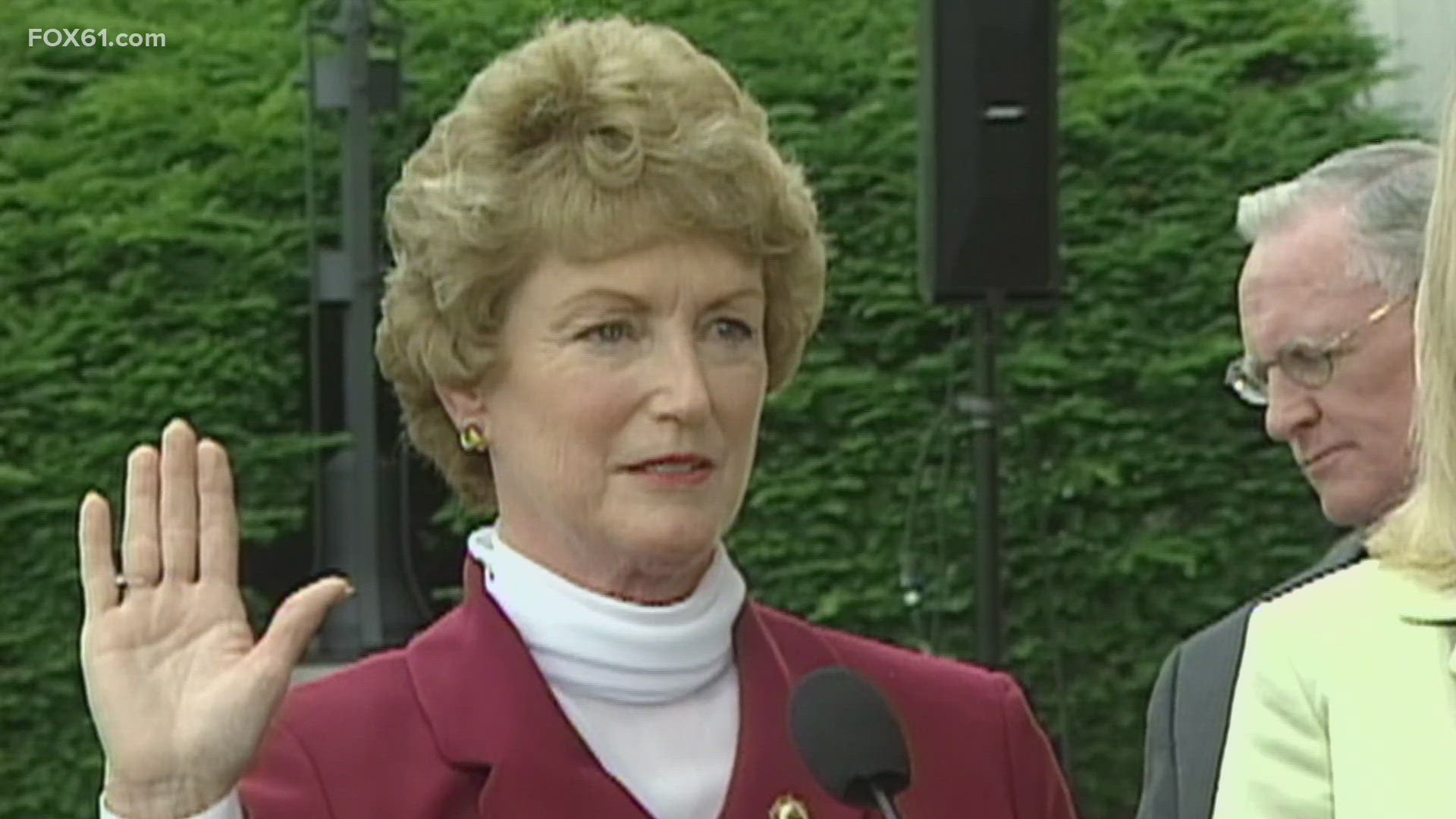Governor Ned Lamont gave his budget address for the upcoming fiscal year this afternoon.
The address comes while the state continues to work through economic issues brought on by the pandemic.
Gov. Lamont said at the beginning of the address proposing the $46 billion budget that despite the pandemic, the state stayed the course, weathered the storm, and because to 'find its economic footing'.
COVID-19 was cited in the address several times to highlight the difficulties the state faces. Gov. Lamont said the pandemic was throwing 'wild cards' into the deck but that the federal government was getting closer to deciding how it would support Connecticut.
Gov. Lamont went on to say that Connecticut was one of the better-positioned states in the country due to residents who took the public health precautions seriously. By doing so, Gov. Lamont said the state was able to keep more of the economy open safely with a lower infection rate than 'almost any other state'.
He acknowledged that the state budged still bears the weight of high fixed costs accumulated over the decades, now with the added difficulties of a pandemic economy. The difficulties, Gov. Lamont said, result in a deficit projection in each of the next two years.
According to Gov. Lamont, with their continuing efforts in streamlining government, they have reduced the projected deficits to less than $1 billion annually which would be balanced by:
- a gradually growing economy;
- state and local aid from Washington; or
- a partial drawdown from the state's $3.5 billion rainy day fund.
Gov. Lamont outlined his budget in five key priorities:
- Defeating COVID-19
- A more affordable Connecticut
- Investing in the state's future
- Modernizing state government.
- Economic growth and an economy that works for all.
Defeating COVID-19
Gov. Lamont said that the state will continue to build in its $500 million investment in a robust testing program and continue to ramp up the vaccination program. Both programs have been rated amount the best in the country, according to the governor.
In addition to public health and safety costs, Gov. Lamont said the most distressed municipalities are also facing diminished tax bases due to tax-exempt properties. The administration said they will help 25 distressed cities and towns by allocating an additional $100 million on top of the projected federal support.
Gov. Lamont's proposed budget also includes an increase in Payment in Lieu of Taxes (PILOT) funding in the upcoming years with 50% coming from the state's cannabis revenues.
A more affordable Connecticut
Gov. Lamont said to him, strengthening the middle class begins with education.
He said that many urban schools are crowded and suburban schools have extra capacity. Gov. Lamont's budget proposes an expansion of the open choice program, beginning in cities like Norwalk and Danbury, so children and those in surrounding communities can go to school in a more diverse environment with 'greater opportunity'.
Gov. Lamont also said the state delivered on its promise and has implemented a teacher recruitment program with an emphasis on hiring more teachers of color which is now approaching 10% statewide. He indicated there is still a 'long way to go'.
Heading to the legislature will be a bill that increases postsecondary school enrollment and success, said Gov. Lamont. He said that it's particularly aimed at first -generation. low-income, and minority students. the bill's goal is to ensure that students complete the student aid applications that will bring millions of additional federal dollars to our residents and educational institutions.
Gov. Lamont said that additional education funding from the federal government would help towns and cities 'hold the line' on property taxes.
Supporting smaller businesses
Small businesses still face many challenges due to the pandemic.
Gov. Lamont said in addition to the Paycheck Protection Program, over 10,000 of the state's small businesses were the recipients of $85 million in small business grants. This support provided a small shot in the arm to help our small businesses keep their doors open.
Over the summer of 2020, Gov. Lamont had announced the creation of business.ct.gov, a website where entrepreneurs can find information and complete everything required to start-up and manage their businesses in the state. Gov. Lamont said more than 44,000 new businesses were registered in the state last year, calling it one of the state's best years ever.
Workforce development
In the fall of 2020, Gov. Lamont had announced the formation of the Office of the Workforce Strategy with a focus on the current and future workforce needs of the state's economy.
Gov. Lamont said his proposed budget and supporting legislation will reflect the ongoing commitment.
Kelli Vallieres, Connecticut's first Chief Workforce Officer, and Gov. Lamont will be working with community colleges and the Connecticut State Colleges & Universities system to build on certificate programs. The programs would provide the skills needed for in-demand jobs such as advanced manufacturing, coding, construction, nursing, and digital media.
Investing in our future
Gov. Lamont said that President Joe Biden had recently celebrated the state for expanding access to education through the distribution of tens of thousands of electronic devices and hotspots for school children.
In the address, Gov. Lamont emphasized the need for accessible, reliable, and high-speed internet when it comes to education, health, and jobs.
"A bill will be sent to the legislature to provide expanded broadband access for the communities that have been 'left behind by the digital revolution', Gov, Lamont said.
Gov. Lamont also spoke on the environment, saying that urban communities are hit the hardest by pollutants that cause comorbidities like asthma which makes people more at risk for COVID-19.
"The Special Transportation Fund is broken," said Gov. Lamont.
He said the current state of Connecticut's transportation fund keeps us from accessing federal funds and risks our ability to fund infrastructure projects.
Gov. Lamont proposed two new sources of revenue that he said would sustainably fund investments in the state's transportation future:
- Connecticut can join the multi-state Transportation Climate Initiative, along with neighboring states live Rhode Island and Massachusetts, which will reduce carbon emissions while raising over $80 million for climate change and public transit investment throughout the state; and
- Connecticut can implement the tractor-trailer mileage-based fee, which is already in place in New York and Oregon. The mileage fee would raise $90 million annually and apply only to those larger heavy-weight trucks, which can cause the vast majority of the damage to our highways. Pete Butt, our new transportation secretary, as well as top Republicans in Washington, support this approach to funding transportation investments. And this funding allows Connecticut to leverage for $1 billion worth of projects over the next five years.
Making healthcare more affordable
Gov. Lamont said the proposed budget would reduce the rate of growth in healthcare costs of active and retired state workers, driving down fixed costs and saving the taxpayers money.
Working in concert with Massachusetts, Gov. Lamont said his affordable care package would limit price increases on pharmaceuticals and premium support leveraged with significant federal dollars will wind up lowering costs for families and small businesses.
Modernizing state government
The state will continue to upgrade its outdated IT systems across government sectors. Gov. Lamont said it will enable state employees and agencies to provide better service at less cost.
Gov. Lamont highlighted that now the DMV can handle more services online such as driver's license renewals. The Department of Consumer Protection (DCP) also has moved 245 operational licenses online, representing about 80% of all state license renewals.
Over the last year, the state government has sped up the process of reducing real estate footprint, shedding extra capacity no longer needed with a technology-enabled workforce, according to Gov. Lamont.
He also said the state has excess capacity in prisons and nursing homes which will result in further downsizing.
Economic growth, one that works for all
The proposed budget provides for the legalization of recreational marijuana.
Gov. Lamont said that neighboring states are offering recreational marijuana on a legal and regulated basis and that Massachusetts dispensaries are advertising extensively in Connecticut. He said rather than surrender the market to out-of-staters, or an underground market, the budget would provide for legalized marijuana in Connecticut.
The revenue created would go to distressed communities that have been hit hardest by 'the war on drugs', said Gov. Lamont. Half of the tax revenues would be allocated to PILOT payments, in addition to a 3% local excise tax option, according to the governor.
The proposed legislation for legalizing marijuana would also authorize the automated erasure of criminal records for those with marijuana-related drug possession, conventions, and charges.
Gov. Lamont also said his administration has been in active negotiations with tribal leaders and partners to bring the state's gaming economy into the digital age, also spurred on by competition by neighboring states.
By the end of his address, Gov. Lamont said that their charge is bigger than just beating back COVID-19 in the state. He is calling it 'Connecticut's Comeback', and asks that all Connecticut residents do it together.



